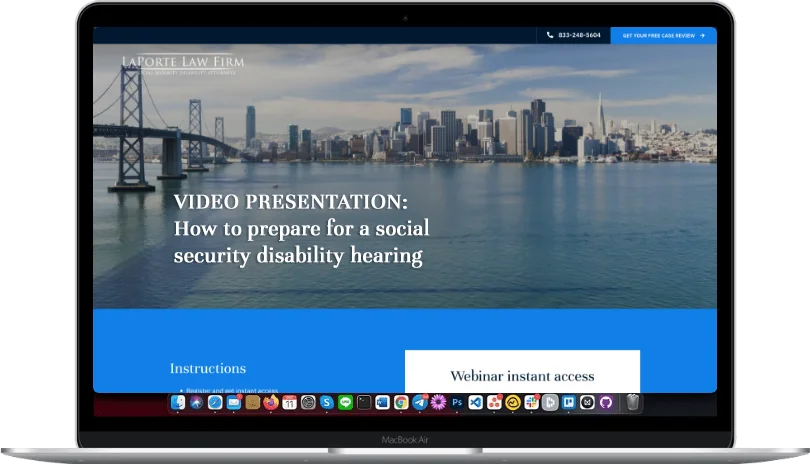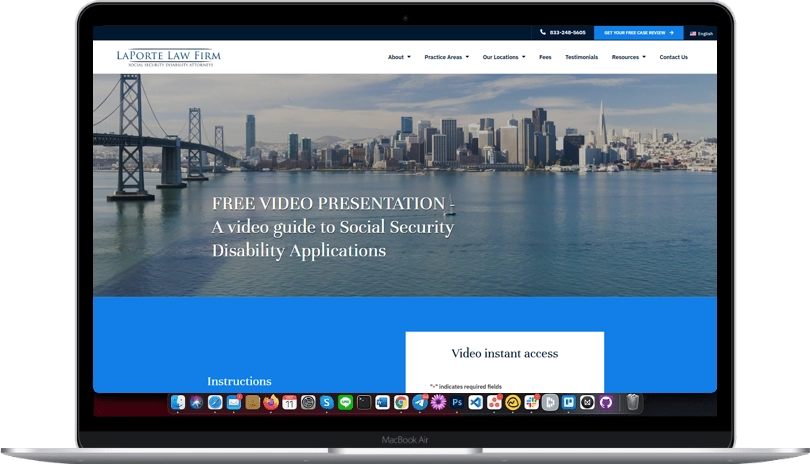
Relocation abroad presents numerous opportunities and challenges, one of which is understanding how your Social Security disability benefits are affected by an international move. Whether you receive Supplemental Security Income (SSI) or Social Security Disability Insurance (SSDI), your eligibility to continue receiving benefits while living outside the United States depends on several factors, including your type of benefit and citizenship status. This article provides a comprehensive overview of the rules and considerations involved in maintaining your Social Security disability benefits while residing overseas, ensuring you remain informed and prepared as you navigate this complex process.
SSDI vs. SSI When Living Abroad
Before you determine whether you can live abroad while receiving disability benefits, it’s important to understand the two main types of benefits provided by the Social Security Administration (SSA): Social Security Disability Insurance and Supplemental Security Income. These programs have different rules, especially when it comes to living outside the United States. Knowing which type of benefit you receive is the first step in understanding your options.
Social Security Disability Insurance: Generally applicable to US . citizens living abroad
SSDI is a federal disability benefit designed for individuals who have a qualifying disability and a sufficient work history. It is considered an insurance benefit because it’s funded through payroll taxes, specifically FICA taxes, that workers pay into the Social Security system. To qualify for SSDI, you generally must have worked and paid into Social Security for at least 5 of the last 10 years before becoming disabled. Your eligibility is based on the number of work credits you’ve earned, which depends on your age and how long you’ve worked.
Subject to certain restrictions and requirements, US citizens, and in some cases, non-US citizens, can continue to receive SSDI benefits while living abroad. However, there are rules about which countries you can live in and still receive payments, and you may be required to report regularly to the SSA.
Supplemental Security Income: Strict limitations outside the United States
Supplemental Security Income is a needs-based program for individuals who are disabled, blind, or over age 65 and have limited income and resources. It is intended to help cover basic needs such as food, clothing, and shelter. Unlike SSDI, SSI does not require a work history. You can qualify even if you’ve never worked. However, to be eligible, you must meet strict financial limits. If you are single, your total countable assets must be under $2,000; if you are married, the limit for the couple is $3,000. To qualify for SSI benefits, you must live in the United States or the Northern Mariana Islands. However, there are exceptions for certain people: children with disabilities whose parents are in the military, and students who are temporarily studying abroad may still be eligible to receive SSI.
Who Can Receive Social Security Disability Benefits Abroad?
Not everyone can receive Social Security disability benefits outside the United States, but certain individuals may still qualify depending on their citizenship, country of residence, and specific benefit type.
US citizens: The most straightforward path for disability payments
When you apply for SSDI benefits and you are a US citizen, you may need to provide certain documentation as proof of your citizenship. This can include a US birth certificate, a US passport, or a naturalization certificate.
If you are a US citizen, you may still receive payments while living outside the United States. “Outside the US” means you have been away from the 50 states, the District of Columbia, Puerto Rico, the US Virgin Islands, Guam, the Northern Mariana Islands, or American Samoa for 30 consecutive days. You will continue to be considered outside the US until you return and stay in one of these areas for at least 30 days in a row.
Non-citizens: Navigating “lawfully present” and residency requirements
If you are not a US citizen, you can still be eligible for SSDI benefits if you are “lawfully present” in the United States. To prove that you are “lawfully present” in the United States, you must provide documentation from the Department of Homeland Security (DHS) or the Department of State. For example, if you have a Form I-551 (Permanent Resident Card, or Green Card), the SSA will use it to verify your nine-digit Alien Registration Number (A-Number). If you have a Form I-94 (Admission-Departure Record), the SSA will need to review it to verify your 11-digit Admission Number.
Non‑US citizens generally lose SSDI payments once they’ve been abroad for six consecutive calendar months, unless an exception applies. To get payments restarted, you must return to the US and stay lawfully for an entire calendar month. If you leave the country again after payments are resumed, the same six‑month rule applies.
You may qualify for a listed exception that allows you to keep receiving benefits without returning to the US beyond the six full calendar months. If you are not a US citizen, you can use the Payments Abroad Screening Tool to determine if you are a citizen of a country that allows you to take advantage of these exceptions.
Country-Specific Restrictions: Where Your Payments Might Stop
The SSA has country-specific rules for paying SSDI benefits abroad. Whether you can receive payments outside the US depends on your country of residence and citizenship.
Countries where payments are prohibited due to US Treasury sanctions
The US Department of the Treasury does not allow Social Security payments to be sent to people living in Cuba or North Korea.
- If you are a US citizen living in one of these countries, your payments will be withheld, but you can receive all missed payments once you move to a country where payments are allowed.
- If you are not a US citizen, you cannot receive payments for any months you lived in Cuba or North Korea, even after you move.
Countries where payments are restricted
In general, Social Security cannot send payments to people living in Azerbaijan, Belarus, Kazakhstan, Kyrgyzstan, Tajikistan, Turkmenistan, or Uzbekistan. However, exceptions may be available for certain eligible individuals.
To qualify, you must meet specific requirements and agree to restricted payment conditions. For details on these conditions and how to apply for an exception, contact Social Security or the Federal Benefits Unit (FBU) in your country of residence.
If you do not qualify for an exception, your payments will be withheld until you move to a country where payments are allowed.
Country-specific rules for non-citizens
As discussed, if you are not a US citizen, the Social Security Administration will stop your SSDI benefits after you’ve been outside the United States for six full calendar months. However, there are exceptions to this rule. For example, if your country of citizenship has a “Totalization Agreement” with the United States, you may qualify for an exception. The United States has Social Security agreements with many countries that coordinate each country’s social security systems. Examples of such countries include Canada, France, Brazil, Spain, the United Kingdom, Japan, and Mexico.
Note that the list of countries is subject to change. The latest version of the list outlines the countries that allow you to continue to receive benefits abroad at present.

Receiving Your Disability Payments While Living Overseas
Federal law requires that all federal benefit payments, including SSDI, be made by electronic direct deposit. In very rare cases, the US Treasury may grant an exception to this rule. You can set up direct deposit to a bank in the US or in any country that has an agreement with the US. If you currently receive your SSDI benefits via paper check, you can switch to district deposit by visiting the Treasury’s Go Direct website , or you may call the Treasury’s Electronic Payment Solution Center at 1-800-333-1795. You can also create a My Social Security account and start or change Direct Deposit online. Another way to receive your benefits electronically is through the Direct Express® debit card. No bank account is necessary. With this option, your federal benefit payments are deposited directly onto your card. Your funds are available on your regular payment date. You can use the card to make purchases, pay bills, or withdraw cash at thousands of locations. Many transactions are free. To sign up or learn more, call Direct Express at 1-800-333-1795 or visit www.USDirectExpress.com . If you’re outside the US, you can call 1-765-778-6290 for assistance.Maintaining Eligibility and Reporting Requirements for Expats
While you are on SSDI benefits, it is important to keep in ongoing communication with SSA regarding required updates and respond to any requests from them to maintain your benefits.Ongoing communication with the Social Security Administration
You must report the following changes to the SSA to maintain your benefits:
- Change of address
- Work outside the United States
- Improvement of disability, or your return to work, after qualifying for disability benefits
- Death
- Inability to manage funds
- Deportation or removal from the United States
- Eligibility for a pension from work not covered by Social Security
- A US Social Security retirement or disability benefit; and
- A retirement or disability pension based on work not covered by US Social Security.
To report a change of address, log in to your personal My Social Security account to update your mailing address for retirement, survivors, or disability benefits. You can also contact your local Social Security office by phone or in person to make the update.
An absence of more than three months outside of the United States requires a change of address from a domestic address to a foreign address.
Any work activity performed outside of the United States requires that you notify the SSA, even if it’s part-time or you’re self-employed. This includes jobs such as apprentice, farmer, sales representative, tutor, or writer. If you own a business, you must report it, even if you don’t actively work in it or aren’t earning income from it.
If a child receiving benefits (no matter their age) starts an apprenticeship, you or the child must notify Social Security or your Federal Benefits Unit, as it may count as work under Social Security rules.
If you receive disability benefits, you must notify Social Security right away if your condition improves and you return to work. You can keep receiving payments for up to nine months during a trial work period , which allows you to test your ability to work without losing your benefits. If you continue working after the trial period, you may still get benefits for an additional three months. If you’re unable to keep working after the trial period, your disability benefits will continue.
SSDI benefits are payable until the month prior to the beneficiary’s date. The death should be reported to the SSA.
Some Social Security benefits recipients may have difficulty managing their money. If this happens, the beneficiary or their caregiver should notify the SSA. In the event you cannot manage your benefits, the SSA can appoint a “representative payee” who is a trusted person, such as a relative or friend, to manage the benefits on your behalf.
If you are deported or removed from the United States for certain reasons under the Immigration and Nationality Act, your Social Security benefits will stop. Payments can only restart if you are lawfully admitted back into the US as a permanent resident.
Even if you are deported, your dependents may still receive benefits if they are US citizens. If your dependents are not US citizens, they can only continue receiving benefits if they remain in the US for the entire month. No benefits will be paid for any month in which they spend any part of the month outside the United States.
For benefits paid before January 2024, your USocial Security benefit may be reduced if you are eligible for both:
This includes some foreign Social Security benefits or private pensions. In such cases, the SSA may use a different formula to calculate your benefit. If you received a retirement or disability pension for non-covered work before January 2024, you should let the SSA know.
Continuing Disability Reviews (CDRs) while abroad
A Continuing Disability Review is a routine check by the SSA to determine whether you still meet the medical requirements to receive disability benefits. How often it happens depends on your condition:
- If improvement is expected, a CDR may occur every 6 to 18 months.
- If improvement is possible but not certain, reviews usually happen every 3 years.
- If improvement is not expected, reviews typically occur every 5 to 7 years.
SSA-21: An essential form for beneficiaries abroad
If a beneficiary is, was, or will be outside the US for more than three months, they must complete and submit Form SSA-21 , or Supplement to Claim of Person Outside the United States. This form is used by the Social Security Administration to update information such as the beneficiary’s address, nonresident alien tax withholding, eligibility for payments while abroad, the date they left the US, and whether they plan to work while outside the country. If you have concerns about how international travel or residence may affect your disability benefits, LaPorte Law Firm can provide the expert guidance you need. Contact us today to schedule a consultation.FAQS
Yes, US citizens can generally receive Social Security Disability Insurance (SSDI) benefits while living abroad.
However, there are a few important exceptions and conditions:
- Most countries allow continued SSDI payments, but US law prohibits sending payments to Cuba and North Korea.
- You must keep the Social Security Administration informed of your address, work activity, and any changes in your condition, even while living overseas.
- You may be required to complete additional forms, such as SSA-21, if you’re outside the US for more than three months.
- SSDI is different from SSI (Supplemental Security Income), which cannot be paid while you live abroad, even if you are a US citizen.
The key difference between SSDI (Social Security Disability Insurance) and SSI (Supplemental Security Income) for Americans living abroad is that SSDI can generally be paid overseas, while SSI cannot.
SSDI is a benefit you earn by working and paying Social Security taxes. If you become disabled and have enough work credits, you can receive SSDI payments even while living outside the United States. As long as you’re a US citizen and not living in a restricted country (such as Cuba or North Korea), you can usually continue to receive SSDI.
Some non-citizens may also qualify under certain exceptions. However, you still need to report any changes in your address, work activity, or medical condition, and you may be subject to Continuing Disability Reviews (CDRs).
SSI, on the other hand, is a needs-based program for people who are elderly, blind, or disabled and have limited income and resources. It is not based on work history. Federal law prohibits SSI payments to anyone who is outside the United States for more than 30 days in a row. Once you’re outside the country that long, SSI payments stop, and they cannot resume until you return and meet all eligibility requirements again. The only rare exception is for children of US military members stationed abroad.
The easiest way to find out if you’re eligible to receive your Social Security disability payments while living overseas is to use the Social Security Administration’s Payments Abroad Screening Tool. This online tool asks you a few simple questions about your citizenship, the type of benefits you receive, and the country where you live or plan to live. Based on your answers, it will tell you whether you can continue receiving your benefits, if there are any restrictions, and whether additional forms or conditions apply. You can access the tool directly on the SSA’s website at ssa.gov/international/payments_outsideUS.html.
















